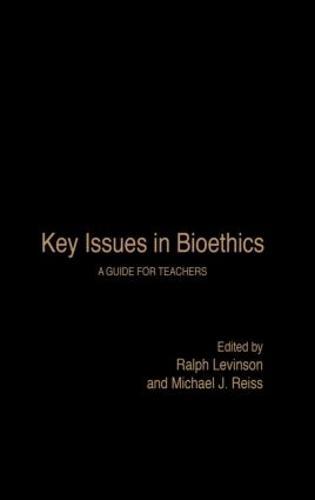Overview
Young people are increasingly being exposed to the huge and complex ethical dilemmas involved in issues such as genetic modification, animal rights and cloning, and they are bringing their views into the classroom. But how can teachers be sure they are sufficiently well-informed to help their pupils make sense of the diverse and emotive arguments surrounding these issues? This book may hold the answer. Written by leading ethicists, scientists and technologists, it offers a balanced and jargon-free guide to such highly debated topics as: - Cloning - In vitro fertilisation - Genetic screening and genetic engineering - Farm animal welfare - The use of animals in medical experiments Written specifically for the non specialist teacher or lecturer, this book also contains suggestions on how to approach the teaching of bioethics and provides useful sources of further information. It may also be of interest to undergraduates on science courses.
Full Product Details
Author: Ralph Levinson , Michael Reiss (Institute of Education, University of London, UK)
Publisher: Taylor & Francis Ltd
Imprint: Routledge
Dimensions:
Width: 15.60cm
, Height: 1.30cm
, Length: 23.40cm
Weight: 0.420kg
ISBN: 9780415309141
ISBN 10: 041530914
Pages: 200
Publication Date: 27 March 2003
Audience:
College/higher education
,
Professional and scholarly
,
Tertiary & Higher Education
,
Professional & Vocational
Format: Hardback
Publisher's Status: Active
Availability: In Print 
This item will be ordered in for you from one of our suppliers. Upon receipt, we will promptly dispatch it out to you. For in store availability, please contact us.
Table of Contents
Part 1 Ethics and education; Chapter 1 Issues and scenarios, Ralph Levinson, Michael J. Reiss; Chapter 2 How we reach ethical conclusions, Michael J. Reiss; Chapter 3 TeachingCloning; Chapter 4 Interview between Professor Ian Wilmut and Ralph Levinson, Ian Wilmut; Chapter 5 Pursuing a rational analysis of cloning, Rebecca Bennett, John Harris; Chapter 6 Cloning? Yuk!, David King; Chapter 7 Clones and cloning, Sarah Franklin; Part 3 In vitro fertilisation; Chapter 8 In vitro fertilisation, Juliet Tizzard; Chapter 9 Surrogacy, Marilyn Strathern; Part 4 Genetic screening; Chapter 10 Genetic testing and screening, Jon Turney; Chapter 11 Genetic screening for sickle cell and thalassaemia, Elizabeth N. Anionwu; Part 5 Genetic engineering of people; Chapter 12 Curing what? Curing when? Curing how?, Bill Albert; Chapter 13 Should we genetically engineer humans?, Michael J. Reiss; Part 6 Farm animal well-being; Chapter 14 Breeding andFarm animal welfare, Joyce D'Silva; Part 7 Animals for medical experiments; Chapter 16 The case for the use of animals in medical experiments, Mark Matfield; Chapter 17 The case against the use of animals in medical experiments, Gill Langley;
Reviews
'The book succeeds in its aim to allow teachers to be well informed about these complex issues and hence to be confident in running, guiding and supporting work with pupils and helping them to come to views that are well informed and founded on a sound knowledge base. This book is essential reading for all science teachers as the issues involved all feature, to varying degrees, in the curriculum at key stages 3 and 4.' - School Science Review 'This is an interesting and thought-provoking book which suggests to teachers how they may frame their discussions on bioethics with students and also provides essays on some of the most relevant issues currently faced by teachers.' - Journal of Biological Education
'We need to encourage a new generation of young scientists and to ensure that the rest of the population has a sound understanding of scientific principles' - Ian Gibson, Labour MP
'The book succeeds in its aim to allow teachers to be well informed about these complex issues and hence to be confident in running, guiding and supporting work with pupils and helping them to come to views that are well informed and founded on a sound knowledge base. This book is essential reading for all science teachers as the issues involved all feature, to varying degrees, in the curriculum at key stages 3 and 4.' - School Science Review 'This is an interesting and thought-provoking book which suggests to teachers how they may frame their discussions on bioethics with students and also provides essays on some of the most relevant issues currently faced by teachers.' - Journal of Biological Education
Author Information
Ralf Levison is a Lecturer in Science Education at the Institute of Education Michael Reiss is Professor of Science Education and Head of the School of Mathematics, Science and Technology, Institute of Education
Tab Content 6
Author Website:
Customer Reviews
Recent Reviews
No review item found!
Add your own review!
Countries Available
All regions
|




